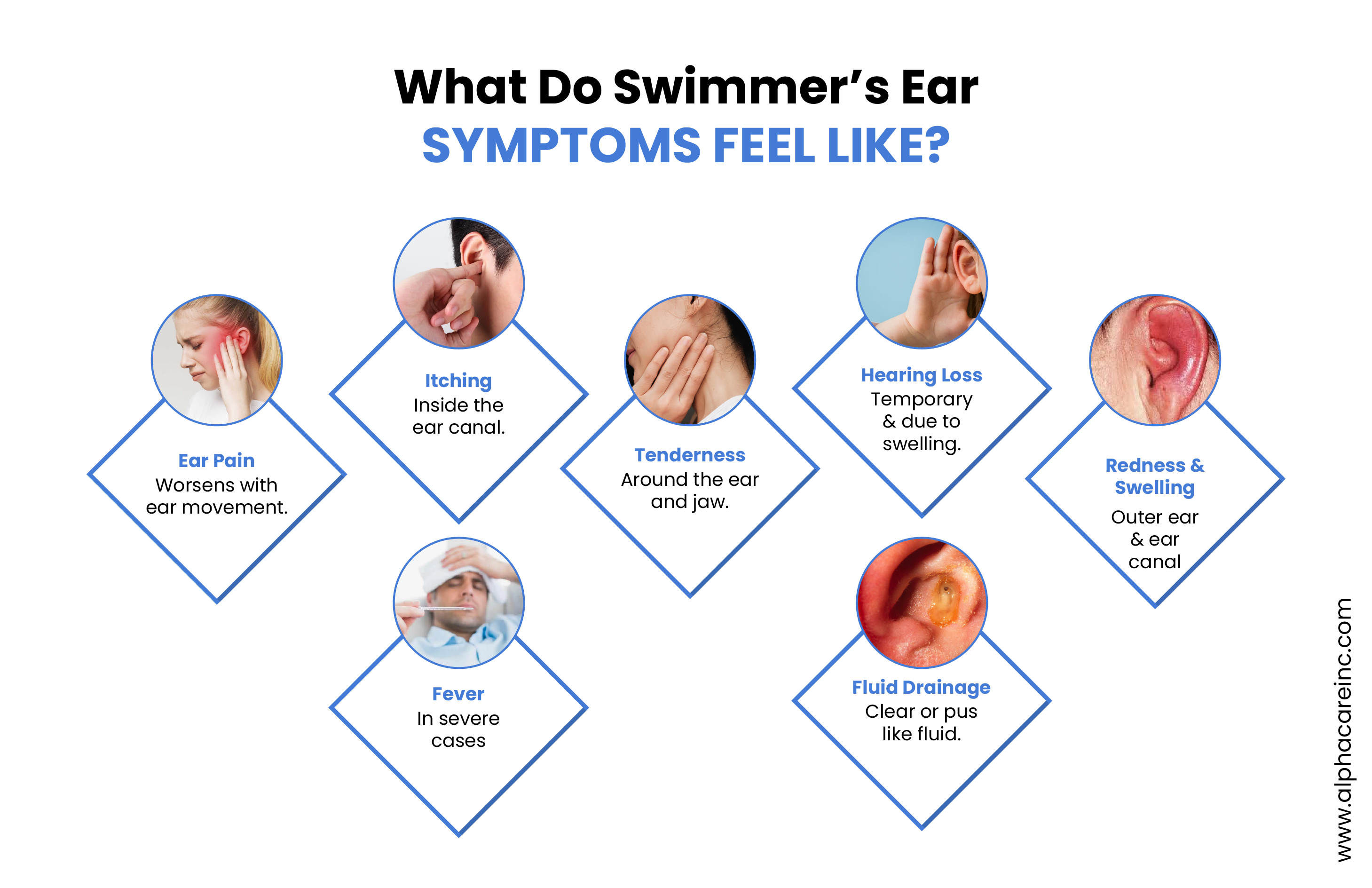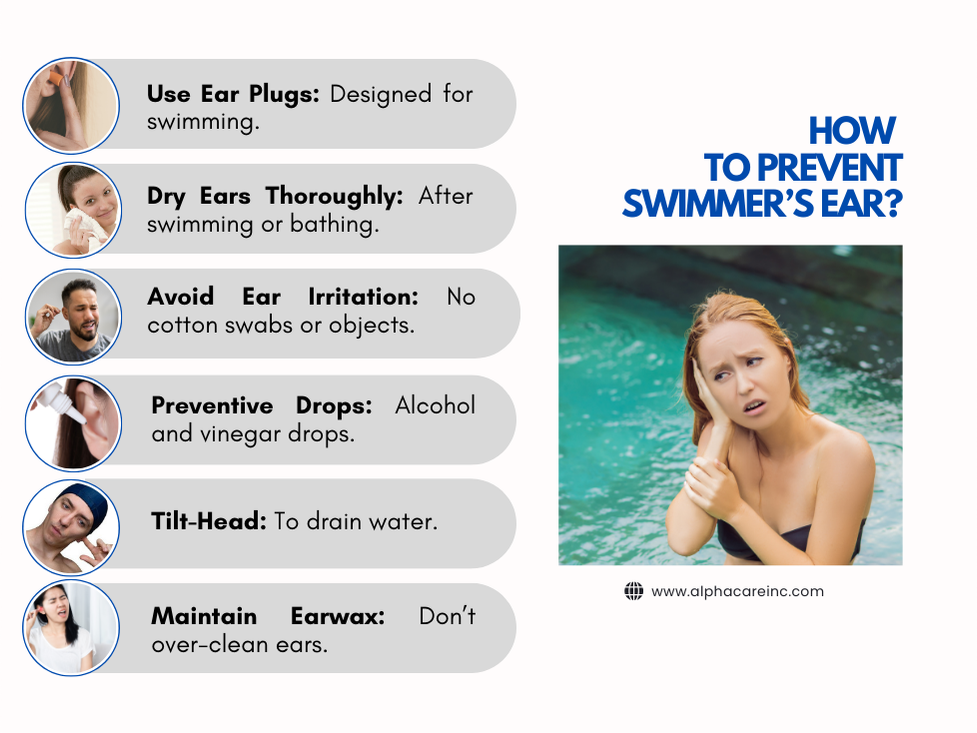Here’s What a Swimmer’s Ear Infection Feels Like—And How to Get Rid of It
Understanding and Treating Swimmer's Ear.
Swimming is a fantastic way to stay fit plus enjoy the water, but unfortunately, it can sometimes lead to an uncomfortable condition known as swimmer’s ear. You know it is not just a minor annoyance if you have ever experienced this. In fact, it can be quite painful.
Let us explore what a swimmer’s ear feels like, its causes, and how you can treat an ear infection with the help of AlphaCare Inc.’s online form submission process.
What is Swimmer’s Ear?
Swimmer’s ear is medically known as otitis externa. It is an infection of the outer ear canal. This condition often occurs when water remains in your ear after swimming. This creates a moist environment that facilitates bacterial growth. While commonly associated with swimming, it can also result from any activity that causes water to be trapped in the ear.
Symptoms of Swimmer’s Ear
Recognizing the symptoms of a swimmer’s ear is the first step toward effective treatment. Following are some of the most common signs.

- Fever: You might develop a low-grade fever in severe cases.
- Tenderness: The area around your ear, including your jaw, may feel tender to the touch.
- Hearing Loss: Temporary hearing loss or a feeling of fullness in the ear can occur because of the blockage and swelling.
- Fluid Drainage: You might notice a clear or pus-like fluid draining from your ear.
- Redness and Swelling: The outer ear and ear canal may become red and swollen.
- Itching: You may experience itching inside your ear canal, which can be quite bothersome.
- Ear Pain: The pain can range from mild to severe and often worsens when you pull on your earlobe or push on the tragus (the small, pointed cartilage at the front of the ear canal).
Causes of Swimmer’s Ear
Swimmer’s ear is primarily caused by bacterial infection, through fungi can also be responsible in some cases. The following factors can increase your risk.
- Exposure to Contaminated Water: Swimming in water with high bacterial levels increases the risk of infection.
- Earwax Build-up: Excessive earwax can trap water in the ear canal.
- Narrow Ear Canals: Some people naturally have narrower ear canals, making it easier for water to get trapped inside.
- Allergies and Skin Conditions: Conditions such as psoriasis or eczema can make your ear canal more susceptible to infection.
- Ear Canal Abrasions: Using fingernails, cotton swabs, or other objects to clean your ears can cause small cuts or abrasions. This provides an entry point for bacteria.
- Excess Moisture: Prolonged exposure to water, especially in swimming pools, hot tubs, and lakes, can lead to water getting trapped in your ear canal.
How to Treat Swimmer’s Ear
Treating a swimmer’s ear effectively involves reducing the infection as well as alleviating symptoms. Here is how AlphaCare Inc. provides cure for ear infections:
1: Submit Your Information:
Start by filling out AlphaCare Inc.’s online form with your medical and personal information. This comprehensive form allows physicians to understand your symptoms and provide them with some knowledge about your medical history without needing an in-person appointment.
2: Prescription Medication:
An AlphaCare Inc. physician will prescribe the appropriate medication on the basis of the information you provide. This may include:
- Pain Relief: Over-the-counter pain relievers like acetaminophen or ibuprofen can help manage pain and reduce swelling.
- Ear Drops: Antibiotic ear drops are commonly prescribed to combat bacterial infection. Steroid ear drops are added sometimes to reduce inflammation.
3: Home Care Tips:
- Use Vinegar and Alcohol Drops: A mixture of equal parts white vinegar and rubbing alcohol can help dry out the ear and restore a healthy pH balance. However, consult with your AlphaCare physician before using this remedy.
- Dry Ears Gently: Dry your ears gently after swimming or bathing. You can use a towel or a hairdryer on a low, cool setting held at least a foot away from your ear.
- Avoid Inserting Objects: Do not insert cotton swabs or any other objects into your ears, as this can worsen the infection.
- Keep Ears Dry: Avoid swimming and keep your ears dry while treating the infection. You can utilize a shower cap or earplugs during bathing.
4: Follow-Up:
Monitor your symptoms as well as follow any additional instructions that are provided by your AlphaCare Inc. physician. In case your symptoms persist or worsen, update your information via a reliable platform like AlphaCare Inc. online form. This will let physicians adjust your treatment plan if necessary.
Prevention Tips
Without a shadow of any doubt, opting for appropriate prevention tips is always better than going for an online ear infection treatment.
Here are some important tips to help you avoid this painful condition:

1: Maintain Earwax: Do not over-clean your ears; earwax helps protect against infections.
2: Tilt Your Head: After swimming, tilt your head to each side to help water drain out of your ears.
3: Use Preventive Drops: Consider using preventive ear drops after swimming if you are prone to a swimmer’s ear. These are usually made of a mixture of alcohol and vinegar. It helps to keep the ear canal dry and balanced.
4: Avoid Irritating Your Ears: Do not use cotton swabs or other objects to clean your ears. Let your ears clean themselves naturally.
5: Dry Your Ears: Make sure to dry your ears thoroughly after swimming or bathing.
6: Use Ear Plugs: Invest in good-quality earplugs designed for swimming to keep water out of your ears.
Common Misconceptions About Swimmer’s Ear
It is important to address some common misconceptions about swimmer’s ear to ensure proper understanding and treatment:
- Myth: It is Just Like a Regular Ear Infection: Swimmer’s ear affects the outer ear canal, whereas regular ear infections typically affect the middle ear.
- Myth: It Will Go Away On Its Own: The infection can worsen without proper treatment. Medical treatment is often necessary.
- Myth: Only Swimmers Get It: While common among swimmers, anyone exposed to water or with ear canal abrasions can get a swimmer’s ear.
When to Seek Immediate Help
Following are the times when you should immediately seek an online prescription for an ear infection and instant medical attention:
- Hearing Loss: If you experience significant hearing loss or severe ear blockage.
- Spreading Redness: If redness spreads on your face or neck.
- High Fever: A high fever could indicate a more serious infection.
- Severe Pain: If the pain is intense and does not subside with pain relievers.
Conclusion
In a nutshell, a swimmer’s ear can be an uncomfortable and painful condition, but you can quickly get back to enjoying your favorite activities with the appropriate treatment. AlphaCare provides telehealth for ear infections with the help of its convenient online form submission. You can receive a prompt diagnosis as well as appropriate prescription medication without the need for an in-person visit.
Keep in mind to take preventive measures to deter future infections plus keep your ears happy and healthy. Please don’t hesitate to reach out to AlphaCare and get ear infection antibiotics online you need if you are experiencing symptoms of a swimmer’s ear.
You can take proactive steps to protect your ear health by understanding the causes, symptoms, and treatment options for swimmer’s ear. Managing and treating swimmer’s ear is easier and more convenient than ever with AlphaCare Inc.
TAGS:
treat an ear infection online ear infection treatment cure for ear infections ear infection antibiotics online online prescription for ear infection telehealth for ear infection


